Selling a Vacation Home: Factors to Consider
6 August 2025
So, you're thinking about selling your vacation home. Maybe the kids aren’t as interested in beach weekends anymore, or perhaps you’re eyeing a new property in a dreamier destination. Whatever’s driving the decision, selling a vacation home isn’t exactly the same as selling your main residence. There are different rules, emotions, and timing considerations that come into play.
That’s why we're diving deep into the key factors you should consider before putting that "For Sale" sign out front. Let's break it down so you can walk into the process feeling confident and ready to make smart choices.
1. Why Are You Selling?
Before listing the property, ask yourself why you’re selling. This might seem obvious, but your motivation matters.Are you hoping to cash in on a hot market? Are the upkeep and travel getting too overwhelming? Maybe you're just not using it enough. Your reasons influence when you should sell, how much money you want to make, and how much effort you’re willing to put in.
💡 If you're selling for financial reasons, you’ll want to keep a close eye on market trends. If it's for emotional reasons—like letting go of family memories—prepare yourself for that mental shift.
2. Know the Market (Local and Seasonal)
Timing in real estate is everything. But with vacation homes, it gets even trickier.You’re not just looking at standard housing market trends—you’ve got to consider tourist seasons too. A mountain cabin might sell like hotcakes in the spring when skiers are planning their next winter trip, while a beach condo might get more offers in late winter as buyers prep for summer.
What to Check:
- Median property values: Are they rising or falling?- Seasonal demand: When do similar homes usually sell?
- Inventory levels: More listings mean more competition.
- Interest rates: These impact buyers' budgets.
📌 Tip: Work with a local real estate agent familiar with vacation properties. They’ll have the inside scoop on the best time to sell and how to market your property.
3. Legal and Tax Implications
Here’s where things can get a bit dicey. Selling a vacation home comes with some not-so-fun paperwork and tax consequences that many people overlook.Capital Gains Tax
In most cases, you’ll pay capital gains tax on the profit you make from selling a second home. Unlike your primary residence, you don't get tax-free gains up to certain limits unless you've lived in the vacation home for at least two out of the last five years.Rental History Impacts Taxes
Have you been renting the property out on Airbnb or VRBO? That rental income—and how much time you’ve actually used the home yourself—can impact your tax bill.🧠 Consider hiring a tax professional to walk you through the specifics. The IRS doesn’t play around, and the last thing you want is a surprise tax bill hitting you when you're already knee-deep in moving boxes.
4. Pricing Strategy
Getting the price right is crucial. Too high and it’ll sit on the market, too low and you might leave money on the table.Factors That Influence Price:
- Location, location, location: Proximity to attractions, water, ski lifts, etc.- Condition of the home: Is it move-in ready or does it need updates?
- Rental income potential: This can be a big selling point for buyers looking to invest.
- HOA fees or community amenities: Pools, golf courses, or concierge services add value.
A Comparative Market Analysis (CMA) from a local agent can help you price competitively based on recent sales of similar properties.
Think of pricing like fishing—cast your line with the right bait (in this case, price), and you’ll reel in the right buyers.
5. Presentation Matters
Even the most beautiful vacation property won’t sell if it doesn’t look good online. In today’s digital age, photos and videos make the first impression.Spruce it Up
- Power wash the exterior.- Add some beachy or cozy decor to set the vibe.
- Fix any noticeable issues (leaky faucet, stained carpet, etc.)
Stage It Thoughtfully
You’re selling a lifestyle, not just square footage. A well-placed hammock or a firepit with Adirondack chairs can help buyers imagine themselves relaxing there.Hire a Pro Photographer
Phone pics just won’t cut it. A pro knows how to play with lighting, capture the best angles, and showcase what makes your property unique—especially if you’ve got views.🎯 Remember: Buyers often make snap judgments online. You want your listing to stop the scroll.
6. Marketing the Right Way
Marketing a vacation home is a little different. You're not just targeting people in the area; you're casting a wider net to potential buyers in other cities or even countries.Go Beyond the Basics
- MLS listing: Of course.- Vacation rental sites: List your sale there too—some renters might want to buy!
- Social media ads: Target people who’ve shown interest in the area.
- Email marketing: Work with an agent who has a list of interested buyers or investors.
Tell a Story
Why did you love owning this home? What makes the area special? Buyers connect with stories more than stats.Put your marketing hat on and ask: If I were scrolling through listings, what would make me stop and click this one?
7. Emotions vs. Economics
This part? It’s a tough one.Vacation homes often come with cherished memories—lazy summers, holiday feasts, family game nights. But once you're in selling mode, you’ve got to start thinking like a businessperson.
Give Yourself Emotional Space
Take photos, reminisce, maybe even write a goodbye letter to the home. It sounds cheesy, but it helps.Once you're past the nostalgia, you'll find it easier to make smart, profit-driven decisions—that includes listening to buyer feedback and being open to negotiation.
8. Understanding the Buyer Pool
Vacation homes attract a different crowd than primary residences. Your potential buyer might be:- A family looking for a second home
- An investor interested in short-term rentals
- A retiree planning for future use
Knowing who you're targeting helps refine your marketing message and property presentation.
For instance, if you're targeting remote workers, showcase the home office setup and reliable Wi-Fi. If it's for long-term vacationers, highlight community events and walkability.
🧲 Think of your buyer as a magnet—how do you tailor the home's appeal to draw them in?
9. Closing Costs and Fees
Don't forget that selling isn't free. There are several costs that can chip away at your total profit.Expect to Pay For:
- Agent commissions (usually 5-6%)- Title insurance
- Closing attorney or escrow fees
- Repairs or credits negotiated after inspection
- Transfer taxes (depending on your state)
Add it all up ahead of time so you're not shocked when it's all said and done.
10. Post-Sale Considerations
Congrats! The home is sold. But now what?Think About:
- Where to reinvest the proceeds: Another property? Stock market? Pay off debt?- Canceling utilities, insurance, and HOA dues
- Filing tax paperwork: Keep all your documents in order
Also, if you had renters with future bookings, you’ll need to handle those—either refund them or transfer them to the new owner if they continue as a rental.
It’s like tying up the final bow on a gift; you want everything neat and complete.
Final Thoughts
Selling a vacation home isn't just about listing and waiting for offers. It's about timing, presentation, emotion, and smart financial planning.Take your time, ask the right questions, and surround yourself with professionals who understand this unique kind of property transaction.
And remember, just because you're letting go of one chapter doesn't mean there isn't another incredible journey ahead. Who knows? Your next vacation home might be even better—and maybe closer to your favorite winery.
all images in this post were generated using AI tools
Category:
Home Selling TipsAuthor:

Travis Lozano
Discussion
rate this article
1 comments
Laura Jimenez
Sure, just sell it and buy a private island instead!
August 14, 2025 at 12:45 PM

Travis Lozano
While a private island sounds appealing, selling a vacation home involves careful consideration of finances, market trends, and personal circumstances.


